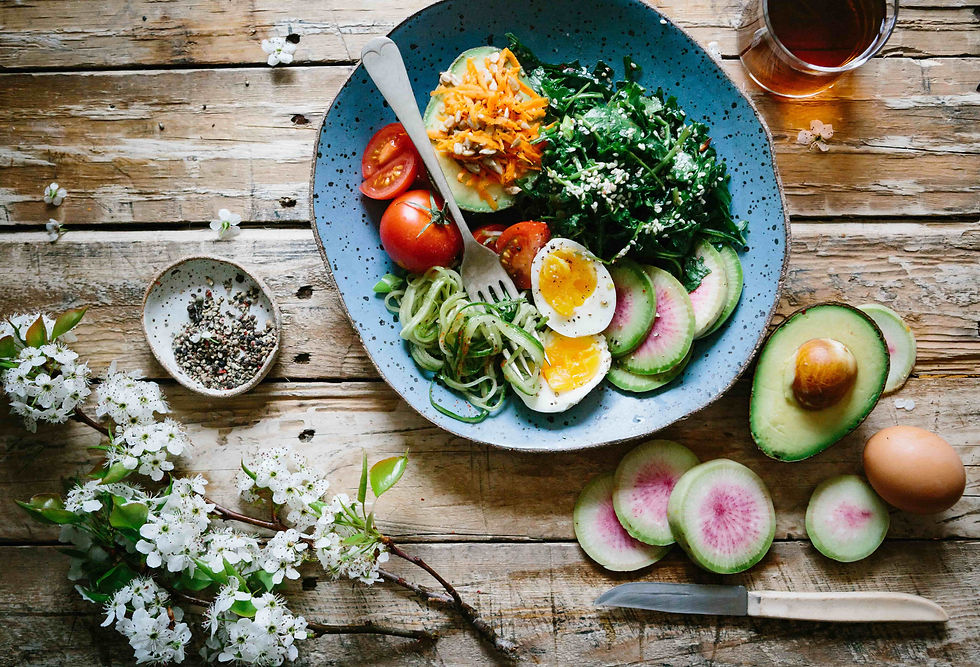Understanding High Blood Pressure: Causes and Natural Solutions
- Katrin Peo
- Apr 19, 2024
- 4 min read
Updated: Sep 14, 2025
Since high blood pressure is a topic that has come up with several of my clients, I thought of covering it in my blog focusing on the causes but also on natural strategies through food and lifestyle modifications to lower the blood pressure.

Over the past two decades, research has revealed a concerning trend: a significant portion of the global population, particularly in economically developing nations, grapples with high blood pressure, also known as hypertension. An estimated 1.28 billion people worldwide have hypertension, but there is a lot one can do to lower the blood pressure and avoid or heal from chronic health conditions caused by high blood pressure.
What is High Blood Pressure?
High blood pressure, or hypertension, occurs when the force exerted on the arteries and blood vessels by the circulating blood becomes too elevated. This strain on the arterial walls places added stress on the heart and can lead to severe health complications, including:
blocked or ruptured blood vessels
arterial damage
aneurysm
heart failure
reduced kidney function
vision loss
loss of cognitive function: concentration, memory and ability to learn
high cholesterol, high insulin, increased waist size
stroke
heart attack
diabetes
Blood pressure readings consist of two numbers: systolic (upper reading) and diastolic (lower reading) pressure. The systolic pressure represents blood force during heartbeats, while diastolic pressure reflects blood pressure when the heart is at rest. A reading above 140/90 mm Hg is considered indicative of hypertension. Normal blood pressure is less than 130/85 mm Hg. Low blood pressure is when it measures in a relaxed state below 100/60 mm Hg consecutively.
Causes of High Blood Pressure
Several factors contribute to high blood pressure, including:
high sugar and refined carbs diet causing spiking of insulin and insulin resistance (when your body is producing high amounts of insulin, your body is retaining water and sodium, which increases the blood volume
emotional stress
excessive alcohol intake
excessive caffeine consumption
smoking
obesity
physical inactivity
Natural Strategies to Lower Blood Pressure
Weight Loss: Shedding excess weight can significantly reduce blood pressure levels. Studies have demonstrated a direct correlation between weight loss and decreased blood pressure, emphasising the importance of maintaining a healthy weight to stabilise neurohormonal activity.
Dietary Changes: Consuming a diet rich in vegetables, fruits, and high-fibre foods as well as focusing on blood-sugar stabilising diet can aid in lowering blood pressure.
Limiting sodium intake (in a modern unhealthy diet people mostly get too much sodium by consuming ultra-processed foods). Learn in this article more about salt, from which food sources people typically get in excess and how to reduce it.
Prioritising protein consumption, where you get 0.8-2g of protein per body weight kg depending on your age and physical activity.
Incorporating potassium-rich foods (avocados, sweet potatoes, spinach, watermelon, coconut water, legumes (beans and lentils), tomato paste, butternut squash, potatoes, dried apricots, Swiss chard, beets, pomegranate, cod, salmon, sardines, banana)
Consuming omega-3 fatty acids found in sources like oily fish (salmon, herring, sardines, mackerel), egg yolks, hemp seeds, ground flaxseeds, walnuts, chia seeds, cod liver oil as well as good quality oils like olive oil, hemp seed oil, camelina oil can have beneficial effects.
Quercetin for blood vessels strengthening (found in raw red onions, apples, peppers, blueberries, bilberries, blackberries, dark cherries, cranberries, tomatoes, broccoli, cabbage, sprouts, kale, spinach, citrus fruits, cocoa, buckwheat, asparagus, olive oil, green tea, rooibos tea, legumes, sage, red wine)
Resveratrol for atherosclerosis (found in red grapes, red wine, raw cocoa, blueberries, lingonberries, bilberries, mulberries, cranberries, peanuts, pistachios, soy)
Consuming apple-cider vinegar in water prior to meals reducing glycemic impact of your meals
Intermittent Fasting: Where you make sure you give your body 12-16h rest during night from food. You can learn more about intermittent fasting and how to go about it from this article.
Regular Exercise: Engaging in physical activity for at least 20 minutes a day can help maintain a healthy weight and lower blood pressure. Both aerobic exercise and strength training have been shown to effectively reduce blood pressure levels.
Stress Reduction: Practicing relaxation techniques such as deep breathing, meditation, and mindfulness can help alleviate stress and lower blood pressure levels.
Adequate Sleep: Ensuring quality sleep is essential for maintaining healthy blood pressure levels. Establishing good sleep habits and addressing conditions like insomnia and sleep apnea can contribute to overall good cardiovascular health.
Sun Exposure: natural infrared in sunlight will penetrate into the blood vessels and activate nitric oxide, which helps to dilate blood vessels and protect mitochondria in the blood vessels.
Supplements: Fish oil supplements, rich in omega-3 fatty acids, have been shown to reduce inflammation and lower blood pressure. Magnesium supplements on top of consuming magnesium rich foods can also help relax blood vessels and reduce the risk of stroke.
Stoping Smoking: Quitting smoking is crucial for reducing the risk of heart disease and lowering blood pressure levels.
Regular Monitoring: Monitoring blood pressure regularly, particularly as one ages, is vital for early detection and management of hypertension. Professional check-ups every six to twelve months can help you stay informed about your cardiovascular health status.
Here are a few links to well-known and respected health professionals to learn more about hypertension:
Natural ways to lower blood pressure- Dr. Axe
Hypertension- Dr. Jockers
Treating the underlying causes of high blood pressure- Dr. Mark Hyman with Dr. George Papanicolaou
High blood pressure poses a significant health risk worldwide, but adopting natural strategies such as weight management, dietary modifications, stress reduction, adequate sleep, and exercise, can help lower blood pressure levels and mitigate associated risks. By incorporating these lifestyle changes and seeking professional guidance from your health care provider and nutritional guidance from nutritionists, you can take proactive steps towards maintaining optimal cardiovascular health.
Don't hesitate to reach out to me at info@katrinpeo.com for nutrition counselling and health coaching to improve your current nutrition and lifestyle habits.






Comments